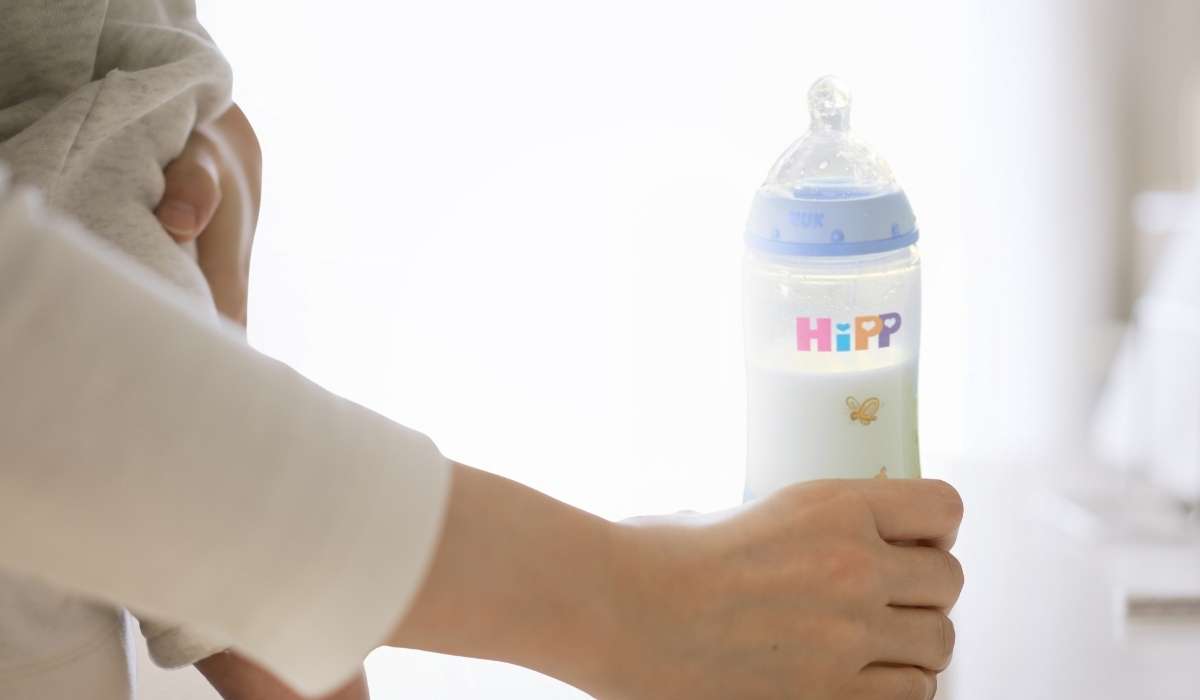Raising a newborn is definitely confusing and stressful for parents. And one of the most challenging aspects is learning how to pick the best formula for your baby. The thing is, between 2 and 15% of babies experience formula intolerance, meaning that their digestive system is sensitive to one or more ingredients of the formula. But the good news is there are plenty of formulas for babies with sensitivities. And today’s guide will help you navigate among them!
We will also help you understand when your baby’s digestive system requires a change in diet and how to deal with formula intolerance symptoms.Additionally, we will cover the not-so-common symptoms that require medical attention. We want to make sure that all new parents out there stay informed and ready to give their babies the best care.
So, without further ado, let’s dive in!
- Common Signs Formula Doesn’t Agree with Baby: What to Look For
- Possible Reasons Why Infant Formula Doesn’t Agree With Baby
- When to Consult a Healthcare Professional: Evaluating the Formula Intolerance Symptoms
- Finding a New Baby Formula: What to Consider
- How to Transition When Changing Formulas
- Tips for Managing the Symptoms of Baby Not Tolerating Formula
- Choosing the Right Formula: Consider Your Baby’s Unique Needs
- Discover Premium European Infant Formulas at Our Online Store
Common Signs Formula Doesn’t Agree with Baby: What to Look For
Most babies are advised to start feeding with a cow’s milk-based formula, which healthy babies often tolerate. That being said, some babies may end up switching formulas due to an intolerance to ingredients in their cow’s milk formula. But how do you know if your baby’s formula isn’t sitting well with them?
Here are the main symptoms of formula intolerance to look for:
- Gastrointestinal issues (gas, bloating, constipation, or diarrhea)
- Allergic reactions (rashes, hives, eczema)
- Colic or excessive fussiness
- Vomiting
- Excessive spit-up and insufficient weight gain
- Blood or mucus in your baby’s stool
- Severe constipation (straining when pooping, producing hard, small stools, or suffering from painful stomach cramps)
- Bellyache (can be identified when your baby frequently pulls their legs toward the belly)
- Constant crying and general signs of discomfort
Of course, you can quickly identify signs of formula intolerance by getting an expert opinion. A nutritionist or a pediatrician can help you understand your baby’s symptoms better, identify their cause, and find the best solution (whether it’s a formula change or something else).
Possible Reasons Why Infant Formula Doesn’t Agree With Baby
If you’ve noticed some signs of formula intolerance, try not to beat yourself up. There are several reasons why some formula-fed babies have digestive sensitivities, and there’s no way of knowing about them before you notice any allergic reactions or digestive system issues.

One of the reasons babies develop intolerance to formula is lactose intolerance or sensitivity (be careful not to confuse this with milk allergy, which we will discuss below).
Lactose intolerance can take on one of two forms. The first case occurs when your baby’s gut doesn’t produce enough of the lactase enzyme to break down lactose, this is known as a partial deficiency. This form of intolerance is common in adulthood and it can also occur temporarily when caused by digestive infections. The second type of lactose intolerance is when your baby’s body doesn’t produce any lactase enzymes at all which is known as a total deficiency. However, this genetic condition is quite rare.
Another reason your baby's formula is upsetting the stomach could be that your baby is allergic to cow’s milk. Cow milk allergy is relatively common in young children. Just like other food allergies, cow's milk protein allergy occurs when your baby’s immune system reacts to the protein. Luckily, most babies outgrow cow’s milk allergy by the time they reach school age.
Another potential reason to consider is your baby's digestive immaturity. An underdeveloped digestive system may cause carbohydrate malabsorption, leading to the fermentation of sugars in the colon and increased levels of gas in the body. This may cause pain and discomfort in babies. Plus, ingredients like corn syrup, starch, or maltodextrin, some of the most common ingredients used in conventional formulas may be difficult for your baby to digest.
When to Consult a Healthcare Professional: Evaluating the Formula Intolerance Symptoms
Now, scaring you is the last thing we want to do, but we want to encourage parents to be as informed as possible! That’s why we are focusing this part of our guide on formula intolerance symptoms that might be a reason for concern.

Rapid onset allergy symptoms to watch for:
- Urticaria (hives)
- Wheezing
- Itching around the mouth
- Swelling of the lips, tongue, or throat
- Coughing or shortness of breath
- Vomiting
- Anaphylaxis, which is characterized by difficulty breathing, a flushed face, swollen throat, itching, or airway constriction. It requires urgent medical treatment with an epinephrine shot.
Slow-onset allergy symptoms to watch for:
- Colic, abdominal cramps
- Bloody stool
- Diarrhea
Be sure to contact a doctor if you notice any of the above symptoms in your child.
Be sure to pay close attention to how your baby’s formula intolerance affects their overall well-being. For instance, if you notice that your little one isn’t gaining weight as they should or experiencing discomfort or pain, it’s crucial to consult your child’s pediatrician.
Finding a New Baby Formula: What to Consider
Doctors often recommend switching formulas when babies develop formula intolerance or allergy symptoms. However, the search for the best baby formula requires several steps.
First, you need to familiarize yourself with alternative baby formula options and choose one based on your little one’s sensitivities. For instance, your baby’s doctor might recommend a lactose-free or hypoallergenic formula.
Lactose-free baby formulas are suitable for babies with lactose intolerance. For babies that don't suffer from lactose intolerance or cow's milk allergy, goat’s milk formula is considered a gentler alternative. Goat milk formula proteins are easier to digest, have less lactose, and are less allergenic than regular cow’s milk.
Hypoallergenic options are hydrolyzed formulas made with broken-down milk proteins. There are partially and extensively hydrolyzed formulas, and the latter is typically advised for babies with cow’s milk allergy.
As for soy formula, it can be a good alternative, but not for babies with cow’s milk allergy symptoms. As many as 50% of kids with CMPA also develop soy protein intolerance if fed soy-based formulas.
Now, we understand that the variety of options can make your head spin. Don’t fret though; your baby’s doctor will likely have several recommendations when switching formulas.
How to Transition When Changing Formulas
There are two transition methods when switching formulas. And while it may sound complicated, don’t stress: the steps are actually quite easy. Plus, your baby’s pediatrician will provide specific instructions, so not much can go wrong here!

The first method is a one-step transition. In this case, you can switch to a new formula straight away. This method is suitable for babies who go from a standard formula to something easier to digest (for instance, a hydrolyzed formula). There should be few side effects in this case, so there’s no need to make the transition gradual.
The second method is a slow transition. In this situation, you gradually introduce your baby to more of their new formula until they are weaned off of their old one completely. This works best when your baby switches from a specialized formula (hydrolyzed, for example). A gradual change can give you more time to see how your baby reacts to the new formula.
To make sure the process goes smoothly, we recommend keeping in touch with a pediatrician or a nutritionist along the way. You should also monitor your baby’s bowel movements and overall well-being to see how your little one reacts to the new formula.
Tips for Managing the Symptoms of Baby Not Tolerating Formula
We’ve all been there: you tried to find the best, top-quality baby formula, but your little one doesn’t seem to digest it very well. Here are some tips for identifying symptoms and good feedings practices to help you manage their intolerance:

- Make sure you prepare the baby formula according to the instructions (add the correct amounts of water and powder)
- Provide your baby a balanced diet when they are ready for weaning (usually around six months) by gradually offering vegetables, fruits, grains, healthy fats, and animal products (unless your pediatrician says otherwise)
- Ensure age-appropriate feeding practices, and don’t give your little one something they aren’t ready to digest
- Closely monitor your baby’s growth and development and stay in touch with their pediatrician
Choosing the Right Formula: Consider Your Baby’s Unique Needs
The quest to find the perfect baby formula can seem daunting. However, there’s no need to fall into despair. If you follow a few simple rules, your baby’s diet will be optimal!
First, make sure you understand your little one’s needs. Talk to a doctor, find out if your baby has food allergies, and determine what exact components cause intolerance to the formula to avoid them in the future.
Next, you might also want to compare different formula options. There are hydrolyzed, soy, hypoallergenic, and several other specialized formulas which are only to be used if your baby requires them for medical reasons. Otherwise, your baby should ideally be breastfeed or use cow or goat's milk based formula. Your choice will depend on your baby’s sensitivities and the doctor’s recommendations!
You can also choose between a powdered, a concentrated liquid, or a ready-to-use formula. The last option is the most convenient and eliminates mixing errors. However, ready-to-use formulas are typically more expensive.
Last (but not least), talk to your pediatrician. A doctor can pick a suitable baby formula based on your little angel's needs. A healthcare professional will also help you avoid infant formula options that might not work for your baby’s digestive system.
Discover Organic Baby Formulas at Our Online Store
If you’re tired of sifting through the endless options trying to find the best baby formula, your search can end here. We are happy to offer new parents high-quality Europen formulas and peace of mind. Our store carries safe and clean formulas to ensure your baby receives only premium nutrition.
A quick note: the European Commission has additional regulations on baby formula that FDA does not, which means these formulas are strictly regulated and super safe for your little one. We are also excited to share that our store offers various formula options. Shopping with us you can choose from organic, hypoallergenic, special, goat milk, or cow's milk formulas for your little one.
Be sure to check out our shop and start exploring the best European baby formulas! You can also consult with a healthcare professional to make an informed decision about which formula is best for your baby.If you need help shopping, contact our customer service team! We offer personalized assistance and recommendations.
Finally, we have a discount for first-time customers to sweeten the deal for you. Get your European baby formula for a great price and see for yourself how good it is!
Wrapping Up
Any baby can develop an intolerance to formula and have an allergic reaction. It doesn’t necessarily mean that you did something wrong. It just means that your little one has certain sensitivities and food allergies.
You can consult a professional, get their personalized advice, and choose a formula that works for your baby. Of course, don’t forget to monitor how your little angel responds to the new formula, and stay in touch with their pediatrician.
And if you want to get premium formula plus attentive, professional customer service, explore our online store and the best European baby formulas!
Breast milk is the best source of nutrition for babies. Before altering your baby's diet or feeding routine, consult your healthcare provider for personalized recommendations. The information in this article is strictly for informational purposes and is not a substitute for medical advice.





